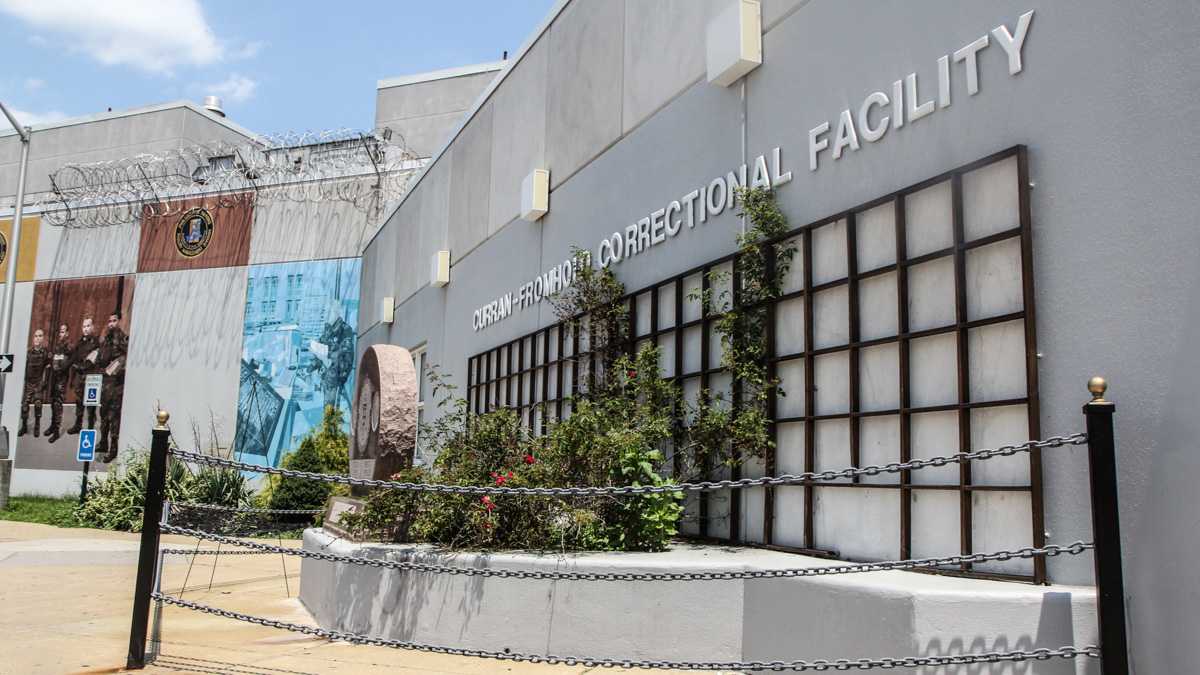Family questions treatment of Holmesburg man who died in a Philly prison

The Curran-Fromhold Correctional Facility on State Road in Philadelphia (Kimberly Paynter/WHYY)
The family of a Holmesburg man who died in prison in December has filed a complaint against the Philadelphia police officers who took him there, claiming that officers left him with serious injuries that may have led to his death.
Mark McGovern, 51, died Dec. 16 at the Curran-Fromhold Correctional Facility, eight days after officers arrested him on charges of aggravated and simple assault, drug offenses, reckless driving, fleeing and eluding police and reckless endangerment, city records show.
The Medical Examiner’s Office hasn’t yet ruled on the cause or manner of death, spokesman Jeff Moran said. Despite that, prisons officials have listed it as “natural” on their records.
The civilian Police Advisory Board, which investigates complaints of police misconduct, also is probing the case, the board’s executive director Kelvyn Anderson confirmed.
“It appears that he got into a chase, crashed into a couple cars and got into a tussle with officers,” Anderson said. “They’re (the family) saying that the injuries occurred because of the tussle with the officers.”
Lt. John Stanford, a police spokesman, didn’t respond to telephone requests for comment.
Mary McGovern, the inmate’s mother, declined to comment.
Marshall D. Bleefeld, a civil-rights attorney who represents the family, said his firm is investigating how a man — healthy when he encountered officers — ended up dead a week later. McGovern, who worked as a supervisor at a suburban chemical company, had no criminal convictions, Bleefeld added.
“We want to know how he got from Point A to Point B,” Bleefeld said, adding that McGovern’s kin has gotten no explanation about how he was injured. “He was in fine condition (before his arrest). We found it odd that the police reports note that he was taken into custody and then taken to the hospital, and the next thing we know, he died.”
Bleefeld said his firm has requested McGovern’s records from the hospital but hasn’t yet received them.
The family also has unanswered questions about the medical treatment — or lack thereof — he received in prison, Bleefeld said.
“It appears that once he was at CFCF, he requested medical care several times, and he did not receive that care,” Bleefeld said.
But prisons spokeswoman Shawn Hawes said McGovern was seen by medical personnel several times during his five days behind bars.
Inmate complaints about healthcare in Philadelphia prisons have fueled several civil-rights lawsuits, perhaps most notably a class-action case in which attorneys claimed overcrowding routinely deprives inmates of quick or easy access to needed medical attention.
Details a mystery
Court records show that McGovern’s path to prison began Dec. 8 on Torresdale Avenue near Cottman in Tacony, where narcotics officers tried to stop him as a drug suspect.
But he fled, driving his car at Sgt. Edward Pisarek, who was on foot and had to leap out of the way, according to an affidavit. He then rammed his car into several other police cruisers as he tried to escape, according to the affidavit. The affidavit’s narrative stops there, mentioning neither how the officers eventually got McGovern into custody nor what injuries McGovern suffered.
McGovern was taken to an area hospital after his arrest, Bleefeld said. Three days later, officers took him to CFCF, where he was held on $100,000 bail, court documents show.
At 7:50 a.m. on Dec. 15, McGovern was found dead in his cell, according to prison records.
“We’re waiting on the same medical evidence that you are; that will be a key component of this,” Bleefeld said.
McGovern had a passenger in his car: Richard Calabrese, 30, of Glenside, was charged with two drug offenses, including possession with intent to manufacture or deliver. His next court appearance is an April 27 pre-trial conference, records show. It’s unclear how Calabrese and McGovern knew each other, and whether Calabrese sustained any injury during his arrest.
Prison deaths down in 2016
McGovern was one of 19 inmates who died in custody last year, city records show.
Only two inmates have died so far this year, and if that pace keeps up, the city’s inmate-death rate could be the lowest in more than a decade.
Still, one of the two deaths — both suicides — already has drawn legal scrutiny. Inmate Gene Wilson, 46, hanged himself in his House of Corrections cell on March 26, five days after officers took him there on drunk-driving charges, prison records show. His family has hired an attorney to investigate.
“The city and the prison did know he had some emotional issues — threats to harm himself and others, suicidal ideation,” said attorney Troy H. Wilson (no relation). “The family is very upset and concerned the prison didn’t do what they were supposed to have done to protect him.”
But Hawes said Wilson “didn’t demonstrate that he was suicidal.”
Inmates known to be suicidal typically are sent to the Detention Center or held in medical units, where a correctional officer is assigned to monitor the inmate around the clock and report several times an hour on his or her doings, Hawes added.
WHYY is your source for fact-based, in-depth journalism and information. As a nonprofit organization, we rely on financial support from readers like you. Please give today.




